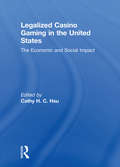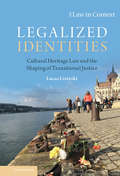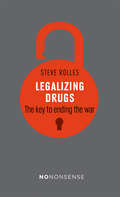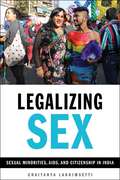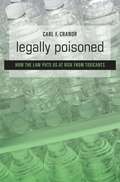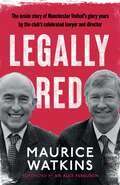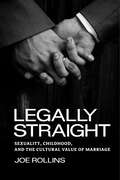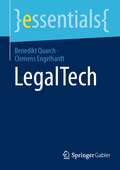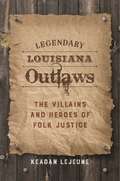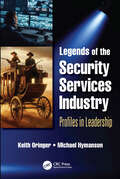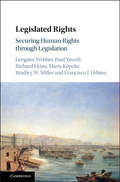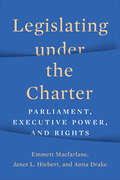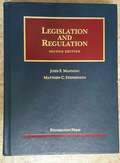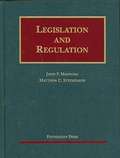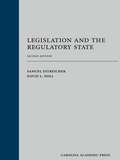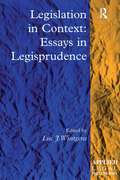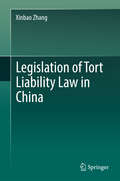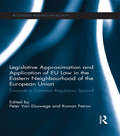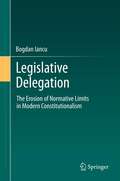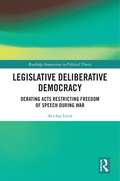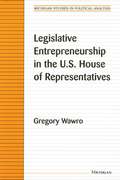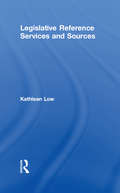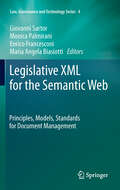- Table View
- List View
Legalized Casino Gaming in the United States: The Economic and Social Impact
by Cathy Hc HsuCovering the entire United States gaming market, Legalized Casino Gaming in the United States provides gaming researchers, policymakers, and hospitality students comprehensive overview of the history, development, legislation, and economic and social impacts of riverboat, land-based, and Native American casino gaming. Containing national and regional research about the industry, this book will provide students with a historical view on gaming and the hospitality industry, offer researchers data and current market status of the industry; and will give policymakers information about the advantages and disadvantages of a gaming industry in their community.Comprehensive and thorough, Legalized Casino Gaming in the United States is full of case studies, data, and surveys that provide you with credible information on community incomes, residents’attitudes about gaming, and gaming taxes in certain states. This fact-filled book will help you evaluate and learn about the pros and cons of the industry, including: reviewing changes in the gaming laws and regulations in particular regions and segments of the industry explaining laws and regulations by state for riverboat and other Native American land-based gaming examining negative and positive social impacts of gaming, including crime; quality of life; community services; availability of entertainment, recreation, and cultural activities; community attractiveness, such as reputation, appearance, cleanliness, and traffic; local resident attitudes; and pathological gaming explaining Nevada’s gaming regulatory system, including the roles of the Nevada Gaming Commission and Gaming Control Board, and discussing issues related to currency transactions, exclusion lists, work permits, customer disputes, and underage gambling discussing positive economic aspects of Native American gaming, such as tax benefits, in Connecticut, Wisconsin, Oregon, and Minnesota, and how the industry impacts surrounding communitiesExamining the industry from ethical, economic, and social standpoints, the contributors offer you several perspectives of a situation, not just one side of an issue, to help you make educated decisions or opinions about gaming. Bolstered with charts, graphs, tables, and future research recommendations, Legalized Casino Gaming in the United States offers you an in-depth and comprehensive look at the gaming industry, helping you weigh the positive and negative effects of one of the most popular areas of hospitality.
Legalized Identities: Cultural Heritage Law and the Shaping of Transitional Justice (Law in Context)
by Lucas LixinskiCultural heritage is a feature of transitioning societies, from museums commemorating the end of a dictatorship to adding places like the Auschwitz-Birkenau concentration camp to the World Heritage List. These processes are governed by specific laws, and yet transitional justice discourses tend to ignore law's role, assuming that memory in transition emerges organically. This book debunks this assumption, showing how cultural heritage law is integral to what memory and cultural identity is possible in transition. Lixinski attempts to reengage with the original promise of transitional justice: to pragmatically advance societies towards a future where atrocities will no longer happen. The promise in the UNESCO Constitution of lasting peace through cultural understanding is possible through focusing on the intersection of cultural heritage law and transitional justice, as Lixinski shows in this ground-breaking book.
Legalizing Drugs: The key to ending the war (No-Nonsense Guides #3)
by Steve RollesThe question is no longer if we should end the war on drugs but how we do it. This No-Nonsense Guide counts the human and financial cost of fifty years of drug war – and proceeds to outline a better way, looking at where drug law reform is already working, how to overcome the obstacles to reform, and what a post-drug war world might look like.
Legalizing Sex: Sexual Minorities, AIDS, and Citizenship in India
by Chaitanya LakkimsettiHow the rise of HIV in India resulted in government protections for gay groups, transgender people, and sex workers This original ethnographic research explores the relationship between the HIV/AIDS epidemic and the rights-based struggles of sexual minorities in contemporary India. Sex workers, gay men, and transgender people became visible in the Indian public sphere in the mid-1980s when the rise of HIV/AIDS became a frightening issue. The Indian state started to fold these groups into national HIV/AIDS policies as “high-risk” groups in an attempt to create an effective response to the epidemic. Lakkimsetti argues that over time the crisis of HIV/AIDS effectively transformed the relationship between sexual minorities and the state from one that was focused on juridical exclusion to one of inclusion. The new relationship then enabled affected groups to demand rights and citizenship from the Indian state that had been previously unimaginable. By illuminating such tactics as mobilizing against a colonial era anti-sodomy law, petitioning the courts for the recognition of gender identity, and stalling attempts to criminalize sexual labor, this book uniquely brings together the struggles of sex workers, transgender people, and gay groups previously studied separately. A closely observed look at the machinations behind recent victories for sexual minorities, this book is essential reading across several fields.
Legally Poisoned: How the Law Puts Us at Risk from Toxicants
by Carl F. CranorTake a random walk through your life and you’ll find it is awash in industrial, often toxic, chemicals. Sip water from a plastic bottle and ingest bisphenol A. Prepare dinner in a non-stick frying pan or wear a layer of Gore-Tex only to be exposed to perfluorinated compounds. Hang curtains, clip your baby into a car seat, watch television—all are manufactured with brominated flame-retardants. Cosmetic ingredients, industrial chemicals, pesticides, and other compounds enter our bodies and remain briefly or permanently. Far too many suspected toxic hazards are unleashed every day that affect the development and function of our brain, immune system, reproductive organs, or hormones. But no public health law requires product testing of most chemical compounds before they enter the market. If products are deemed dangerous, toxicants must be forcibly reduced or removed—but only after harm has been done. In this scientifically rigorous legal analysis, Carl Cranor argues that just as pharmaceuticals and pesticides cannot be sold without pre-market testing, other chemical products should be subject to the same safety measures. Cranor shows, in terrifying detail, what risks we run, and that it is entirely possible to design a less dangerous commercial world.
Legally Red: With a foreword by Sir Alex Ferguson
by Maurice WatkinsAt Old Trafford, in the corridors of power, Maurice Watkins was the guiding force. As the club solicitor, and later a director, for thirty-six years he was the man to whom Manchester United turned to negotiate the legal minefields. In his autobiography, written before his passing in 2021, the layers of secrecy are peeled back to expose the brilliance of a character who shaped the club's destiny.From the sacking of Tommy Docherty, through the late-night drive to Scotland to lure Alex Ferguson to the hot seat, to the courtroom defence of Eric Cantona for his 'kung-fu kick' on an abusive fan, Maurice Watkins was the key figure behind the scenes at United. Yet he was also front and centre for the triumphs under Ferguson and the rise of players such as David Beckham and Cristiano Ronaldo. Later, a lifelong love of sports made him a natural for leadership roles throughout the sporting world.Legally Red takes you into the boardroom of one of the greatest football clubs in the world in one of its most successful eras. But, ultimately, it's a story that goes beyond the legal battles of Manchester United. It reveals the human stories, heroics and heartaches that shaped Watkins's remarkable journey.
Legally Red: With a foreword by Sir Alex Ferguson
by Maurice WatkinsAt Old Trafford, in the corridors of power, Maurice Watkins was the guiding force. As the club solicitor, and later a director, for thirty-six years he was the man to whom Manchester United turned to negotiate the legal minefields. In his autobiography, written before his passing in 2021, the layers of secrecy are peeled back to expose the brilliance of a character who shaped the club's destiny.From the sacking of Tommy Docherty, through the late-night drive to Scotland to lure Alex Ferguson to the hot seat, to the courtroom defence of Eric Cantona for his 'kung-fu kick' on an abusive fan, Maurice Watkins was the key figure behind the scenes at United. Yet he was also front and centre for the triumphs under Ferguson and the rise of players such as David Beckham and Cristiano Ronaldo. Later, a lifelong love of sports made him a natural for leadership roles throughout the sporting world.Legally Red takes you into the boardroom of one of the greatest football clubs in the world in one of its most successful eras. But, ultimately, it's a story that goes beyond the legal battles of Manchester United. It reveals the human stories, heroics and heartaches that shaped Watkins's remarkable journey.
Legally Straight: Sexuality, Childhood, and the Cultural Value of Marriage (Critical America #63)
by Joe RollinsArgues that cultural conceptions of children – and childhood – played a key role in legalizing gay marriage Legally Straight offers a critical reading of the legal debates over lesbian and gay marriage in the United States. The book draws on key judicial opinions to trace how our understanding of heterosexuality and marriage has changed. Upon closer inspection, it seemed that the cultural value of marriage was becoming tarnished and the trouble appeared to center on one very specific issue: reproduction. As opponents of lesbian and gay marriage emphasized the link between marriage and accidental pregnancy, the evidence mounted, the arguments proliferated, and resistance began to turn against itself. Heterosexuality, it seemed for a moment, was little more than a set of palliative prescriptions for the worst of human behavior, and children became the victims. It thus became the province of the courts to reinforce the cultural value of marriage by resisting what came to be known as the “procreation argument,” the assertion that marriage exists primarily to regulate the unruly aspects of heterosexual reproduction. Cultural conceptions of children and childhood were being put at risk as gays and lesbians were denied marriage, so that writing lesbian and gay families into the marriage law became the better option.
LegalTech (essentials)
by Clemens Engelhardt Benedikt QuarchDas essential vermittelt einen Überblick über den LegalTech-Markt, seine Akteure, Herausforderungen und Vorteile sowie Investionsmöglichkeiten. LegalTech ist derzeit in aller Munde und es haben sich auf dem europäischen Markt zahlreiche Unternehmen etabliert, die die Rechtsdurchsetzung digitalisieren und sowohl Verbraucher:innen als auch Anwält:innen helfen, effizienter zu arbeiten. Dabei ist LegalTech als wichtiger Teil des Fortschritts nicht mehr aus dem Rechtsmarkt wegzudenken.
Legendary Louisiana Outlaws: The Villains and Heroes of Folk Justice
by Keagan LejeuneFrom the infamous pirate Jean Laffite and the storied couple Bonnie and Clyde, to less familiar bandits like train-robber Eugene Bunch and suspected murderer Leather Britches Smith, Legendary Louisiana Outlaws explores Louisiana's most fascinating fugitives. In this entertaining volume, Keagan LeJeune draws from historical accounts and current folklore to examine the specific moments and legal climate that spawned these memorable characters. He shows how Laffite embodied Louisiana's shift from an entrenched French and Spanish legal system to an American one, and relates how the notorious groups like the West and Kimbrell Clan served as community leaders and law officers but covertly preyed on Louisiana's Neutral Strip residents until citizens took the law into their own hands. Likewise, the bootlegging Dunn brothers in Vinton, he explains, demonstrate folk justice's distinction between an acceptable criminal act (operating an illegal moonshine still) and an unacceptable one (cold-blooded murder). Recounting each outlaw's life, LeJeune also considers their motives for breaking the law as well as their attempts at evading capture. Running from authorities and trying to escape imprisonment or even death, these men and women often relied on the support of ordinary citizens, sympathetic in the face of oppressive and unfair laws. Through the lens of folk life, LeJeune's engaging narrative demonstrates how a justice system functions and changes and highlights Louisiana's particular challenges in adapting a system of law and order to work for everyone.
Legends of the Security Services Industry: Profiles in Leadership
by Keith Oringer Michael HymansonThe global contract security market now totals over $200 billion, with the number of private security officers exceeding that of public law enforcement officers. But this wasn’t always the case.Legends of the Security Services Industry: Profiles in Leadership presents the unique stories of 15 industry legends, who transformed the industry from early private detective and small night watch companies into large-scale contract security companies. The large-scale companies include, but are not limited to, Pinkerton, Burns International, The Wackenhut Corporation, Guardsmark, Wells Fargo, and U.S. Security Associates; as well as today’s leading security companies, Allied Universal, Securitas, G4S, Prosegur, and GardaWorld.The book begins in the nineteenth century, with early U.S. legendary detectives: Allan Pinkerton and William Burns. Then, the book focuses largely from the mid-twentieth century to the present, where successive generations of legends built large-scale contract security companies which competed with, and then acquired, those formed by the early legends. Part II legends George Wackenhut, Ira Lipman, and Tom Wathen; Part III legends, Charles Schneider, Kenneth W. Oringer, William Whitmore, Jr., and Albert Berger; and Part IV, Scandinavian legends Jørgen Philip-Sørensen, Lars Nørby Johansen, and Thomas Berglund, all developed major security companies. Part V includes current global security leaders Helena Revoredo Gut, Stephan Crétier, and Steve Jones. Part VI reviews the timelines and successful leadership of these legendary leaders, with a look at the future of the industry.The legends’ personal stories contain colorful insight into how they capitalized on the industry’s explosive growth. While each generation of legends faced unique social and competitive landscapes, their personal stories illustrate how they respectively succeeded. Their leadership and management prowess enabled them to achieve great success, as they displayed vision and achieved their goals through grit, determination, hard work, charisma, organizational skills, and calculated risk-taking.Each chapter has been extensively researched and includes firsthand accounts based on interviews with living legends, colleagues, and family of deceased legends. Personal, company and signature event photos add further color to the moving narrative. Their stories are not only highly interesting, but also provide a framework for current leaders, and the next generation of entrepreneurs, on how to build and lead large-scale security service companies. With a Foreword from Robert D. McCrie, PhD, longtime John Jay Professor and editor of the renowned industry publication The Security Letter.
Legislated Rights: Securing Human Rights through Legislation
by Grégoire Webber Bradley W. Miller Paul Yowell Richard Ekins Maris Köpcke Francisco J. UrbinaThe important aspects of human wellbeing outlined in human rights instruments and constitutional bills of rights can only be adequately secured as and when they are rendered the object of specific rights and corresponding duties. It is often assumed that the main responsibility for specifying the content of such genuine rights lies with courts. Legislated Rights: Securing Human Rights through Legislation argues against this assumption, by showing how legislatures can and should be at the centre of the practice of human rights. This jointly authored book explores how and why legislatures, being strategically placed within a system of positive law, can help realise human rights through modes of protection that courts cannot provide by way of judicial review.
Legislating under the Charter: Parliament, Executive Power, and Rights
by Emmett Macfarlane Janet Hiebert Anna DrakeLegislating under the Charter explores how governments and Parliament justify limitations on rights when advancing laws that raise rights concerns or when responding to judicial decisions under the Canadian Charter of Rights and Freedoms. Through an analysis of legislation concerning criminal justice policy, the approval of new safe consumption sites, sex work, and medical assistance in dying, the book provides a detailed analysis of the extent and nature of parliamentary deliberation about rights, the extent to which government initiatives are properly scrutinized, and the broader institutional relationships under the Charter. The authors draw from a host of qualitative data, including research interviews and examination of judicial decisions, various bills under study, Hansard debates from the floor of the House of Commons, committee and Senate scrutiny of legislation, bureaucratic advice and Charter statements by the department of justice, and news media coverage. The book offers a set of concrete reform proposals to improve the transparency and accountability of executive and bureaucratic vetting processes, and to strengthen the role of Parliament in upholding constitutional values and holding the government to account. In doing so, Legislating under the Charter contributes to the broader comparative scholarship on models of judicial review, morality policy, policy change, and constitutionalism.
Legislation And Regulation (University Casebook Ser.)
by John F. Manning Matthew C. StephensonThe updated casebook, Manning and Stephenson's Legislation and Regulation, 2d, is designed for a first-year class on Legislation & Regulation, and provides a proven, ready-to-use set of materials for those interested in introducing such a class to their 1L curriculum. The book focuses on the tools and methods of interpreting legal texts, using Supreme Court and other appellate decisions as the primary texts, yet the note material gently introduces students to applicable insights from political science, history, economics, and philosophy. The book aims to familiarize students with tools and techniques that lawyers and judges use when crafting legal arguments in statutory or regulatory contexts, and to give students a sense of the larger questions of institutional design implicated by these interpretive questions.
Legislation and Regulation
by John F. Manning Matthew C. StephensonThis casebook is specifically designed for a first-year class on Legislation Regulation, and provides a proven, ready-to-use set of materials for schools or instructors interested in introducing such a class to their 1L curriculum.
Legislation and the Regulatory State
by Samuel Estreicher David L. NollEstreicher & Noll's Legislation and the Regulatory State provides an accessible, up-to-date introduction to the institutions and procedures of the modern regulatory state. Designed to emphasize regulatory policy and the practical aspects of administrative lawyering, the casebook explores Congress's reasons for regulating and the choices it makes when enacting legislation, the legislative process and tools of statutory interpretation, administrative agencies' position within the Constitution's system of separated powers, the Administrative Procedure Act, and judicial review of agency action.
Legislation in Context: Essays In Legisprudence (Applied Legal Philosophy)
by Luc J. Wintgens Philippe ThionThe essays in this volume set out to provide a rational framework for legislation. Whilst legislation and regulation is the result of a political process, this volume considers whether they can also be the object of theoretical study. It examines the problems that are common to most European legal systems by applying the tools of legal theory to legislative problems ('legisprudence'). While traditional legal theory deals predominantly with the question of the application of law by a judge, legisprudence enlarges the scope of study to include the creation of law by the legislator. The essays published in the volume develop a new range of insights into the relationship between legislative problems and legal theory in a way that will interest legal scholars throughout the world. Specifically the work will attract the attention of those involved with constitutional law, EU law, human rights law and legal theory.
Legislation of Tort Liability Law in China
by Xinbao ZhangThis book studies the fundamental conflicts between the protections on the legal rights and interests of victims and the freedom of infringers to act first. It is divided into four parts, the first of which explores the relevant legal methodology in order to provide possible solutions to difficult problems in Chinese tort liability law. Secondly, it puts forward a range of suggestions on how to resolve key issues in China's torts liability law, including the general provisions; the provisions concerning the fault principle; the provisions of the non-fault principle; the special liability relation; damages; and defenses and related issues. Thirdly, the book addresses major institutional issues, including: the theory of consensus force; joint infringements; and operators' duty of care; as well as several key relations: between the right to claim insurance compensation and the right to claim compensation for personal injury; between the right to claim tort liability and the right to exercise property rights; and between the right to claim tort liability and the right to reject unjust enrichment. Further aspects in this section include compensation for death; mental damages; pure economic loss and compensation; punitive compensation; and compensation for road traffic accidents. Lastly, the book explores special issues in tort liability law, e. g. the infringement of media rights, and the specific tort liability in various administrative laws and regulations.
Legislative Approximation and Application of EU Law in the Eastern Neighbourhood of the European Union: Towards a Common Regulatory Space? (Routledge Research in EU Law)
by Peter Van Elsuwege and Roman PetrovThis book explores the exportation and application of European Union legislation beyond EU borders. It clarifies the means and instruments of the voluntary application of the EU’s norms by third countries and analyses in detail the process of legislative approximation between the EU and its East European neighbours. It also assesses the extent to which the EU is successful in promoting its legal standards abroad. The first part of the book addresses the EU’s mechanisms and instruments promoting the export of its own laws and practices to other countries. Key issues include the post-Lisbon constitutional basis for the EU’s engagement with its Eastern neighbours (Art. 8 TEU); the different methods of acquis export and the impact of a new generation of Association Agreements providing for the establishment of Deep and Comprehensive Free Trade Areas (DCFTAs) and, ultimately, a Neighbourhood Economic Community (NEC) between the EU and its Eastern partners. The second part of the book includes substantive country reports that analyse the process of legislative approximation and application of EU law in the Eastern Partnership countries and Russia, authored by leading academics from the countries concerned. While currently these countries are not working towards full EU membership, the EU encourages them to approximate and converge their legislation with the EU acquis. The book also offers a unique picture of current practice of the application of EU law by judiciaries in the countries of the Eastern Partnership and Russia. The book concludes with reflections on the multi-faceted character of legislative approximation and the challenges surrounding the application of EU law in the EU’s Eastern neighbourhood. The conclusions reached are highly informative as to the effectiveness of present and future EU external regional policies aimed at the promotion of EU common values and EU legislation into the legal orders of third countries.
Legislative Delegation
by Bogdan IancuAn overarching question of contemporary constitutionalism is whether equilibriums devised prior to the emergence of the modern administrative-industrial state can be preserved or recreated by means of fundamental law. The book approaches this problem indirectly, through the conceptual lens offered by constitutional developments relating to the adoption of normative limitations on the delegation of law-making authority. Three analytical strands (constitutional theory, constitutional history, and contemporary constitutional and administrative law) run through the argument. They merge into a broader account of the conceptual ramifications, the phenomenon, and the constitutional treatment of delegation in a number of paradigmatic legal systems. As it is argued, the development and failure of constitutional rules imposing limits on legislative delegation reveal the conditions for the possibility of classical limited government and, conversely, the erosion of normativity in contemporary constitutionalism.
Legislative Deliberative Democracy: Debating Acts Restricting Freedom of Speech during War (Routledge Innovations in Political Theory)
by Avichai LevitFreedom of speech is a basic right in a democracy. During war however, national legislatures tend to enact laws that restrict this basic right. Under what circumstances can such laws be democratically legitimate? Avichai Levit argues that the degree of democratic legitimacy of laws that restrict freedom of speech during war, depends on the extent of legislature deliberation on such laws. The more law makers in both chambers of the legislature, seriously consider information and arguments, reason on the common good, and seek to persuade and decide the best legislative outcome, in committees and on the floor, the more democratic legitimacy can be associated with such laws. This book fills a gap in the scholarly literature regarding the evaluation of the democratic legitimacy of laws restricting freedom of speech during war, by bridging different theoretical perceptions and presenting an alternative normative account of deliberative democracy which focuses on the deliberations of a national legislature. Using the United States as a case study, this book goes into the details of Congressional deliberation during World War I, World War II and the Cold War, as well as the political histories that brought about such laws. Legislative Deliberative Democracy will be of interest to academics and students alike in the fields of American Constitutional law, Political theory, American politics and political history.
Legislative Entrepreneurship in the U.S. House of Representatives
by Gregory WawroWhen members are elected to the House of Representatives they have a certain freedom to decide how they will act as members and how they will build their reputations. Just as in the market place entrepreneurs build businesses, so in the House of Representatives members have the freedom to choose to build legislative programs that will enhance their reputations in the institution. And yet entrepreneurship is also costly to members. Gregory Wawro explains why members of the House engage in legislative entrepreneurship by examining what motivates them to acquire policy knowledge, draft legislation, build coalitions, and push their legislation in the House. He considers what incentives members have to perform what many have perceived to be the difficult and unrewarding tasks of legislating. This book shows how becoming a legislative entrepreneur relates to members' goals of reelection, enacting good public policy, and obtaining influence in the House. The analysis differs from previous studies of this behavior, which for the most part have employed case study methods and have relied on anecdotal evidence to support their arguments. Wawro analyzes legislative entrepreneurship in a general and systematic fashion, developing hypotheses from rational-choice-based theories and testing these hypotheses using quantitative methods. Wawro argues that members engage in legislative entrepreneurship in order to get ahead within the House. He finds that the more legislative entrepreneurship that members engage in, the more likely it is that they will advance to prestigious positions. This book is of interest to students of Congress, legislative behavior and institutions, elections, and campaign finance. Gregory Wawro is Assistant Professor of Political Science, Columbia University.
Legislative Reference Services and Sources
by Peter Gellatly Kathleen LowHere is the first introductory guide to all aspects of providing legislative reference services. Unlike special libraries which deal with one specific discipline, legislative reference bureaus must deal with a full spectrum of subject areas and meet the unique needs of elected and appointed officials and their staffs. This guide helps librarians find the best current resources and services to answer the varied demands for information typical of legislative reference libraries. Legislative Reference Services and Sources facilitates the work of legislative librarians and makes them confident so that they can supply legislators and their staffs with the information needed to effectively examine, draft, or enact legislation of benefit to the public.No other book on the market provides such a comprehensive overview of legislative reference services. Author Kathleen Low acquaints librarians with over 100 sources useful in responding to information requests from legislators. A wide range of valuable topics are covered that will help legislative reference librarians meet the information demands of legislators and lawmakers including: an overview of essential reference services needed by legislators and their staffs specific protocols and forms of etiquette to observe when promoting services to elected and appointed officials over 100 frequently consulted titles in legislative references the usefulness of online resources how to recognize special services and sensitivity warranted by patrons and the services and responses to expect in returnLegislative Reference Services and Sources addresses the legislative reference services commonly provided, promotion of services, the librarian/client relationship, client expectations, the ethics of responding to certain requests, and the core resources used in legislative reference requests. It is an invaluable tool for beginning level legislative librarians, public services librarians, and state and federal agency librarians who need an introduction to this unique type of information service.
Legislative XML for the Semantic Web
by Giovanni Sartor Maria Angela Biasiotti Monica Palmirani Enrico FrancesconiThis volume examines the basic layers of the standard-based creation and usage of legislation. In particular, it addresses the identification of legislative documents, their structure, the basic metadata and legislative changes. Since mature technologies and established practices are already in place for these layers, a standard-based approach is a necessary aspect of the up-to-date management of legislative resources. Starting out with an overview of the context for the use of XML standards in legislation, the book next examines the rationale of standard-based management of legislative documents. It goes on to address such issues as naming, the Akoma-Ntoso document model, the contribution of standard-based document management to handling legislative dynamics, meta-standards and interchange standards. The volume concludes with a discussion of semantic resources and a review on systems and projects.
Legislator Success in Fragmented Congresses in Argentina
by Ernesto Calvo"Plurality-led Congresses are among the most pervasive and least studied phenomena in presidential systems around the world. Often conflated with divided government, where an organized opposition controls a majority of seats in congress, plurality-led congresses are characterized by a party with fewer than 50 percent of the seats still in control of the legislative gates. Extensive gatekeeping authority without plenary majorities, this book shows, leads to policy outcomes that are substantially different from those observed in majority-led congresses. Through detailed analyses of legislative success in Argentina and Uruguay, this book explores the determinants of law enactment in fragmented congresses. It describes in detail how the lack of majority support explains legislative success in standing committees, the chamber directorate, and the plenary floor"--
